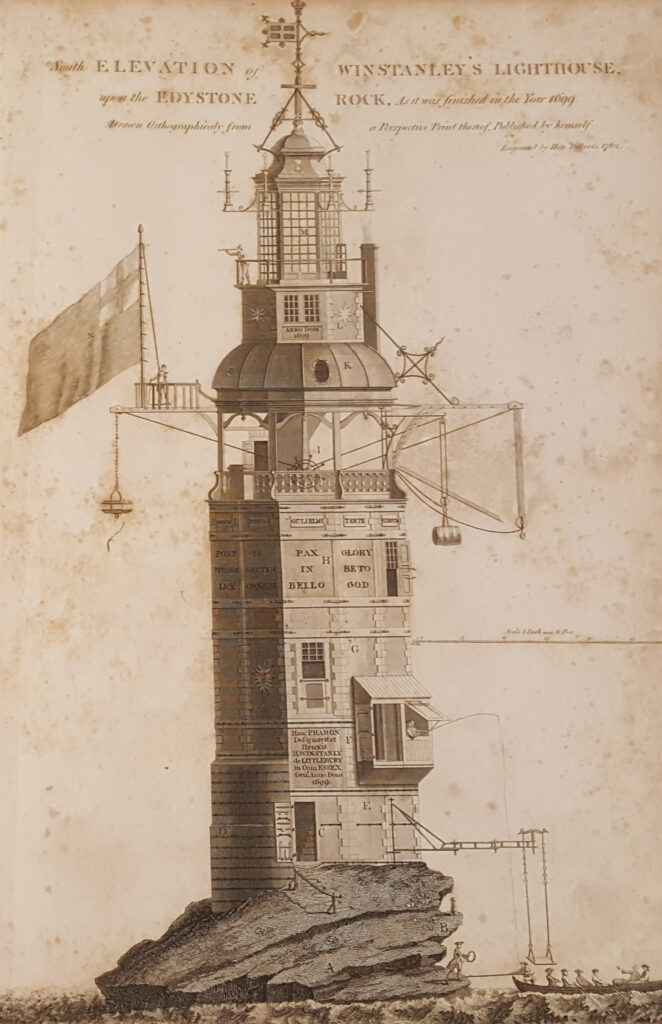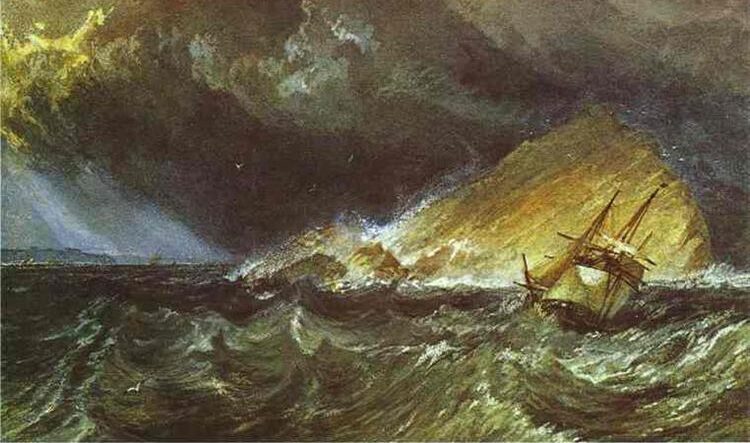In this extract by Daniel Defoe, he reflects on the town of Plymouth, noting its importance as a safe anchorage and tells the tale of Winstanley’s death as the first Eddystone lighthouse was swept away in the renowned ‘Great storm’ of November 1703. He then recounts the loss of 14 vessels with their cargoes, crews and passengers, dashed onto the rocks in an August storm the following year.


Plymouth is indeed a town of consideration, and of great importance to the publick. The situation of it between two very large inlets of the sea, and in the bottom of a large bay, which is very remarkable for the advantage of navigation. The Sound, or bay is compass’d on every side with hills, and the shear generally steep and rocky, tho’ the anchorage is good, and it is pretty safe riding: In the entrance to this bay, lyes a large and most dangerous rock, which at high-water is covered, but at low-tide lyes bare, where many a good ship has been lost, even in the view of safety, and many a ships crew drown’d in the night, before help could be had for them. Upon this rock, which was call’d the Edystone, from its situation, the famous Mr. Winstanley undertook to build a light-house for the direction of sailors, and with great art, and expedition finished it; which work considering its height, the magnitude of its building, and the little hold there was, by which it was possible to fasten it to the rock, stood to admiration, and bore out many a bitter storm.
Mr. Winstanly often visited, and frequently strengthened the building, by new works, and was so confident of its firmness, and stability, that he usually said, he only desir’d to be in it when a storm should happen, for many people had told him, it would certainly fall, if it came to blow a little harder than ordinary. But he happen’d at last to be in it once too often; Namely, when that dreadful tempest blew, Nov. the 27, 1703. This tempest began on the Wednesday before, and blew with such violence, and shook the light-house so much, that as they told me there, Mr. Winstanly would fain have been on shoar, and made signals for help, but no boats durst go off to him; and to finish the tragedy, on the Friday, Nov. 26, when the tempest was so redoubled, that it became a terror to the whole nation; the first sight there seaward, that the people of Plymouth, were presented with in the morning after the storm, was the bare Eddystone, the light-house being gone; in which Mr. Winstanly, and all that were with him perish’d, and were never seen, or heard of since: But that which was a worse loss still, was, that a few days after a merchant’s ship call’d the Winchelsea homeward bound from Virginia, not knowing the Eddystone lighthouse was down; for want of the light that should have been seen run foul of the rock it self, and was lost with all her lading, and most of her men, but there is now another light-house built on the same rock.
What other disasters happen’d at the same time, in the Sound, and in the roads about Plymouth, is not my business: They are also publish’d in other books, to which I refer. One thing, which I was a witness to, on a former journey to this place, I cannot omit: It was the next year after that great storm, and but a little sooner in the year, being in August, I was at Plymouth, and walking on the Hoo, which is a plain on the edge of the sea, looking to the road, I observed the evening so serene, so calm, so bright, and the sea so smooth, that a finer sight, I think, I never saw; there was very little wind, but what was, seem’d to be westerly; and, about an hour after, it blew a little breeze at south west, with which wind there came into the Sound, that night, and the next morning, a fleet of fourteen sail of ships, from Barbadoes; richly loaden, for London: Having been long at sea, most of the captains and passengers came on shore to refresh themselves, as is usual, after such tedious voyages, and the ships rode all in the Sound on that side next to Catwater: As is customary, upon safe arriving to their native country, there was a general joy and rejoycing, both on board and on shore.
The next day the wind began to freshen, especially in the afternoon, and the sea to be disturbed, and very hard it blew at night, but all was well for that time; but the night after it blew a dreadful storm, not much inferior, for the time it lasted, to the storm mentioned above, which blew down the light-house on the Eddy Stone; about midnight the noise indeed was very dreadful, what with the roaring of the sea, and of the wind, intermixed with the firing of guns for help from the ships, the cries of the seamen and people on shore, and, which was worse, the cries of those, which were driven on shore by the tempest, and dash’d in pieces. In a word, all the fleet, except three, or thereabouts, were dash’d to pieces against the rocks, and sunk in the sea, most of the men being drowned: Those three, who were sav’d, received so much damage, that their lading was almost all spoil’d: One ship in the dark of the night, the men not knowing where they were, run into Catwater, and run on shore there, by which she was however sav’d from shipwreck, and the lives of her crew were saved also.
This was a melancholly morning indeed; nothing was to be seen but wrecks of the ships, and a foaming furious sea, hi that very place where they rode all in joy and triumph, but the evening before: The captains, passengers and officers who were, as I have said, gone on shoar, between the joy of saving their lives, and the affliction of having lost their ships, their cargoes, and their friends, were objects indeed worth our compassion and observation; and there was a great variety of the passions to be observed in them: Now lamenting their losses, then giving thanks for their deliverance, many of the passengers had lost their all, and were, as they expressed themselves, utterly undone; they were, I say, now lamenting their losses, with violent excesses of grief; then giving thanks for their lives, and that they should be brought on shore, as it were, on purpose to be sav’d from death; then again in tears for such as were drowned; the various cases were indeed very affecting, and, in many things, very instructing.
Daniel Defoe, A tour thro’ the whole island of Great Britain, divided into circuits or journies Letter 3 part 3: From Exeter to Land’s End, 1727 (London: JM Dent and Co, 1927)

You must be logged in to post a comment.